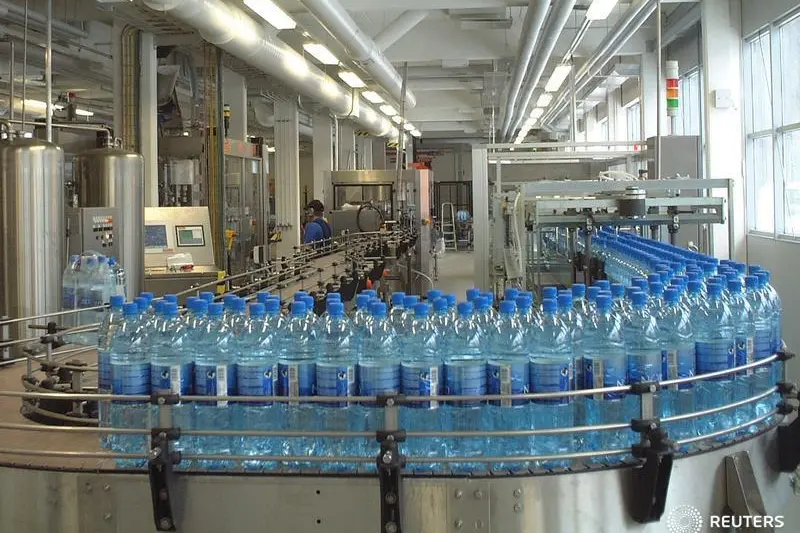PHOTO
Saturday, Apr 15, 2017
Dubai: When thirst kicks in, we tend to reach out to the closest mineral bottled water we have at hand, without taking a single glance at its composition.
Most of the time, people are not very much concerned about the components of bottled waters, and are less likely to choose one brand over the other, unless it was the packaging or temperature of one bottle that was favored more during that particular moment.
Taking a second to scan the labels on a bottle of water does make a difference, said Nadine Aoun, a nutritionist and dietitian at Medcare Hospital. Drinking water has lots of benefits and is important for our survival, but not every bottled water is the same in its composition.
“People never tend to read water composition since we all know the importance of water and that a person can live 40 days without eating but never without drinking,” she said.
Each element in different brands of bottled water is important for the body, she adds. “One must read carefully the composition of water, and especially look for the amount of sodium content.”
Excess sodium consumption increases the risk of hypertension, heart diseases and strokes, which is why a very few residents pick bottled water with low sodium content. According to Nadine, even though sodium in drinking water contributes only a small fraction of a person’s overall sodium intake, it is highly recommended to drink water low in sodium content.
“Sodium is the main positively charged ion outside the body’s cells,” said Nadine. “It attracts water, and this is why too much sodium raises blood pressure and aggravates hypertension. It is rare to find diets that lack sodium.”
As per the recommendations by Dietary Reference Intake (DRI), the recommended intake for people between the ages of 19-50 is 1,500mg of sodium per day, for those between 51-70 it’s 1,300mg per day and those 71 years and older it’s 1,200mg per day.
“It is for nutrition’s best sake to choose water rich in calcium and magnesium but low in sodium. Since our diet is very high in salt, it is recommended to drink water with sodium content lower than 20 mg/L. If you drink two liters of water containing 20 mg/l of sodium you will reach 40 mg that is about five per cent of the total intake,” she said.
However, to actually reduce daily intake of sodium and follow proper sodium restricted diet, in case one suffers from hypertension or any other medical condition, it would be more logical to change one’s nutrition, said Nadine.
Gulf News looked at the composition of six different brands of bottled waters sold in the UAE and found that each contained a certain level of sodium. Most of them had sodium that was less 20mg/L. Only one of the six bottles contained the highest level of sodium, which was 110mg/L.
Another brand had recently introduced the sodium-free version of their bottle as healthier water option. While the second lowest sodium volume found in one brand was 2.5mg/L. Nadine recommended such volumes for those who want to reduce their sodium intakes. One brand
Nadine explained that water rich in calcium and magnesium has various benefits for the body.
“Most of the body’s magnesium is in the bones and can be drawn out for all the cells to use in building protein and using energy. Those who lack magnesium suffer from cramps, fatigue, low stress resistance, and heart beat irregularities.”
As for calcium, it makes up the bone and tooth structure and plays roles in nerve transmission, muscle contraction, and blood clotting, she added. “Calcium absorption rises when there is a dietary deficiency or an increased need such as during growth. Calcium helps prevent osteoporosis and reduce hypertension, and is important for growing children.”
Nadine added that A PH of 7.4 and 7.6 is ideal in drinking water as it matches the PH of the tummy. As for other elements like sulfate, Nadine said water naturally contains small quantities of Sulfate, which are transferred in water bodies from the atmosphere. “There is no recommended intake, but too much sulfate in drinking water, either naturally or through contamination, can cause diarrhea or can damage the colon.”
Nitrate water content of about 10mg/litre is considered normal and natural, she said. “The maximum admissible content of fluoride in water, on the other hand, which stabalises the bones and makes teeth resistant to decay, is 1mg/Litre because an excess can cause fluorosis. This water is recommended during growth and for those affected by osteoporosis but is not intended for long periods.”
“Bicarbonate in mineral water is natural coming from the rocks through which the water filters and the levels have little effect on health.”
Tap Water in the UAE
Tap water in the UAE is suitable for consumption, she confirmed, only when there’s a proper sanitation of the tanks in their buildings once in every six months and a utilization of filters.
“Some tap water contains bacteria that may cause many diseases. This especially happens when the tanks and pipes are poorly maintained and not cleaned regularly. Bacteria can accumulate and cause stomach upsets and other health problems especially for children and elderly people on the long term.”
As for the sodium content found in tap water, a few years back when Gulf News tested four samples of tap water from four different areas in Dubai — Deira, Bur Dubai, Silicon Oasis, and Jumeirah — the sodium levels found were quite high with the lowest containing 46mg/liter and the highest 65mg/liter.
Does bottled water with higher sodium affect weight?
This is a misunderstood concept said Nadine. Excess sodium consumption from eating a meal high in salt can increase the body’s water content which can show up on the scale, but the body sheds the excess over the next day or so as the sodium is excreted.
“Gaining or losing water weight does not reflect a change in body fat. Fat weight takes days or weeks to change noticeably, whereas water weight can change overnight. If blood sodium rises, as it will after a person eats salted foods, thirst ensures that the person will drink water until the sodium-to-water ratio is restored. Then the kidneys excrete the extra water along the extra sodium.”
She said dieters think that eating too much salt or drinking too much water will make them gain weight, “but they do not gain fat of course. They gain water but a healthy body excretes this excess of water immediately.”
Excess salt is excreted as soon as enough water is drunk to carry the salt out of the body. So to keep body salt under control is to eat salt in moderation and drink more water.
By Mary Achkhanian Staff Reporter
Gulf News 2017. All rights reserved.





















